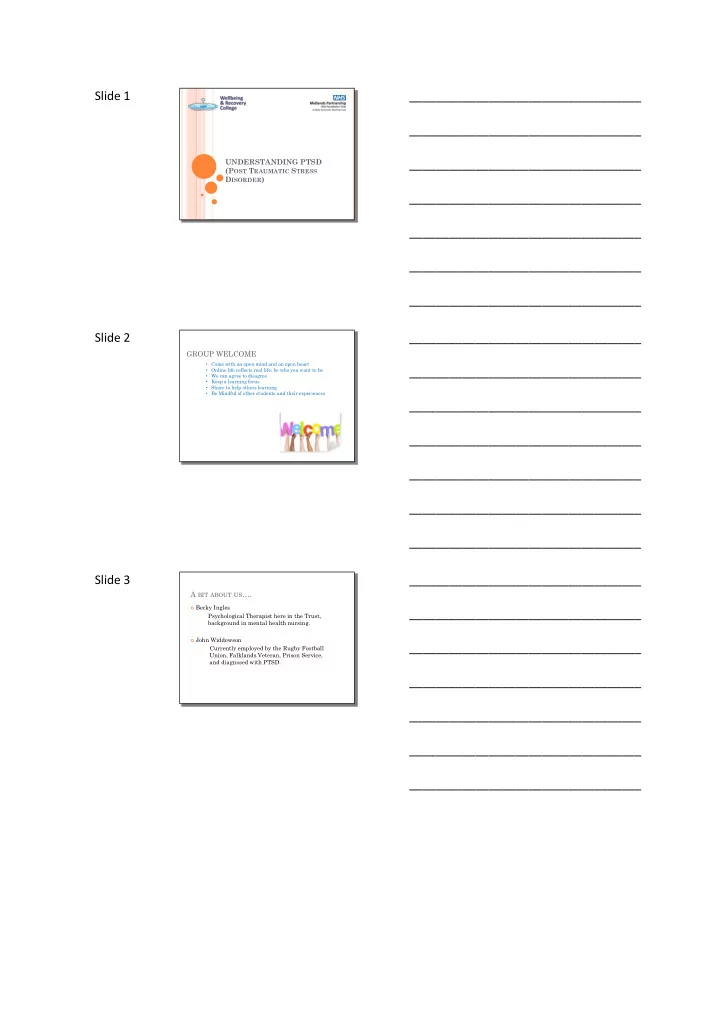

Slide 1 ___________________________________ ___________________________________ ___________________________________ UNDERSTANDING PTSD (P OST T RAUMATIC S TRESS D ISORDER ) ___________________________________ ___________________________________ ___________________________________ ___________________________________ Slide 2 ___________________________________ GROUP WELCOME • Come with an open mind and an open heart ___________________________________ • Online life reflects real life; be who you want to be • We can agree to disagree • Keep a learning focus • Share to help others learning • Be Mindful of other students and their experiences ___________________________________ ___________________________________ ___________________________________ ___________________________________ ___________________________________ Slide 3 ___________________________________ A BIT ABOUT US …. ¢ Becky Ingles ___________________________________ Psychological Therapist here in the Trust, background in mental health nursing. ¢ John Widdowson ___________________________________ Currently employed by the Rugby Football Union, Falklands Veteran, Prison Service, and diagnosed with PTSD. ___________________________________ ___________________________________ ___________________________________ ___________________________________
Slide 4 ___________________________________ L EARNING O UTCOMES ¢ Understand what PTSD is and what some ___________________________________ of the common symptoms are ¢ Understand the difference between PTSD and trauma ¢ Basic knowledge of PTSD treatments ___________________________________ ¢ Learn some strategies that may help reduce the impact of trauma ___________________________________ ___________________________________ ___________________________________ ___________________________________ Slide 5 ___________________________________ T RAUMA VS PTSD ¢ PTSD is a clinical diagnosis ___________________________________ ¢ Trauma is a term to describe something that has had a significant emotional impact on someone. ¢ Trauma is defined in the English dictionary as: ‘a deeply distressing or disturbing experience’ ___________________________________ ‘an emotional shock following a stressful event or physical injury’. ¢ • If someone has experienced a trauma and are affected emotionally by it, however do not meet the criteria for PTSD, this does not mean that ___________________________________ they do not need or should be excluded from treatment. ___________________________________ ___________________________________ ___________________________________ Slide 6 ___________________________________ ___________________________________ ___________________________________ ___________________________________ ___________________________________ ___________________________________ ___________________________________
Slide 7 ___________________________________ S O … WHAT IS PTSD? ¢ Develops following experience of or witnessing of ___________________________________ a stressful event or situation of an exceptionally threatening or catastrophic nature. ¢ Around 25-30% people experiencing a traumatic event go on to develop PTSD. ___________________________________ ¢ Usually develops right after the traumatic experience however in some cases the onset of symptoms may be delayed. ___________________________________ ___________________________________ ___________________________________ ___________________________________ Slide 8 ___________________________________ ¢ Activity ___________________________________ ¢ Now’s your chance to type in the chat box what you think the signs and symptoms of PTSD are… ___________________________________ ___________________________________ ___________________________________ ___________________________________ ___________________________________ Slide 9 ___________________________________ o Re-experiencing ___________________________________ ― involuntary re-experiencing of the event – flashbacks, acting or feeling as if the event is re-occuring – being ‘back there’. ― Nightmares. ___________________________________ ― Repetitive and distressing intrusive images. ― Physiological reactions – anxiety, sweating, pounding heart, ___________________________________ ___________________________________ ___________________________________ ___________________________________
Slide 10 ___________________________________ ¢ Avoidance of reminders ___________________________________ - People, situations, circumstances associated with the event - Trying to avoid thinking or talking about it, trying to push or erase it from the mind ___________________________________ - Ruminating – questions about the event, what could have prevented it, been done differently etc. ___________________________________ ___________________________________ ___________________________________ ___________________________________ Slide 11 ___________________________________ ¢ Hyper arousal ___________________________________ - Hypervigilance for threat - Exaggerated startle response - Irritability, trouble concentrating - Trouble sleeping ___________________________________ • Emotional Numbing - Feeling detached - Difficulty experiencing feelings - Amnesia from certain parts of the event ___________________________________ - Giving up previous activities that were significant ___________________________________ ___________________________________ ___________________________________ Slide 12 ___________________________________ ¢ Anxiety – flight, fight or freeze ___________________________________ response ¢ http://www.getselfhelp.co.uk/docs/Ad ___________________________________ renaline.pdf ___________________________________ ___________________________________ ___________________________________ ___________________________________
Slide 13 ___________________________________ QUICK 5 MINUTE BREAK ___________________________________ ___________________________________ ___________________________________ ___________________________________ ___________________________________ ___________________________________ Slide 14 ___________________________________ W HO CAN EXPERIENCE PTSD? Activity: ___________________________________ What sort of experiences may lead to PTSD or trauma? ___________________________________ Again – put your ideas in the chat box ___________________________________ ___________________________________ ___________________________________ ___________________________________ Slide 15 ___________________________________ W HY DO SOME PEOPLE GET PTSD? ¢ It is thought that the natural process has got ‘stuck’ ___________________________________ - A traumatic event being sudden, unexpected, causing many deaths, going on for a prolonged period of time and/or causing mutilation or involving children is more likely to result in PTSD ___________________________________ - There are different functions that may be involved in causing PTSD such as adrenaline remaining high due to the vivid memories of the traumatic event - Hippocampus – part of the brain that processes ___________________________________ memories; it is believed that high levels of stress hormones may stop it from working. ___________________________________ ___________________________________ ___________________________________
Slide 16 ___________________________________ ___________________________________ ___________________________________ ___________________________________ ___________________________________ ___________________________________ ___________________________________ Slide 17 ___________________________________ QUICK 5 MINUTE BREAK ¢ ___________________________________ ___________________________________ ___________________________________ ___________________________________ ___________________________________ ___________________________________ Slide 18 ___________________________________ T REATMENT ¢ Mild symptoms present for less than 4 weeks ___________________________________ after the trauma – watchful waiting ¢ Moderate to severe symptoms brief psychological intervention 5 sessions if seen within the first month after the event ___________________________________ ¢ Beyond the first month treated as chronic PTSD. ___________________________________ ___________________________________ ___________________________________ ___________________________________
Recommend
More recommend